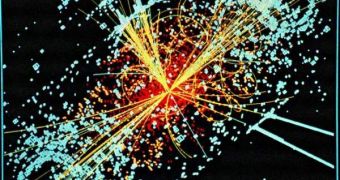According to representatives at the European Organization for Nuclear Research (CERN), the Large Hadron Collider (LHC) has officially become the most powerful particle accelerator in the world. The gigantic machine, which is arguably the largest and most complicated physics project ever undertaken, has exceeded the previous record, held by the Tevatron, the accelerator operated by the Fermi National Accelerator Laboratory (Fermilab), located in Batavia, Illinois.
The LHC recently exceeded the 1.18 TeV (trillion electron volts) energy level, surpassing by far the previous record of 0.98 TeV, held by the Tevatron. This achievement is the first in a series of world records the Collider is scheduled to break. Admittedly, all future records that it will exceed will be its own, until the machine reaches its maximum energy level. This is scheduled to take place no earlier than 2011, as engineers operating the device plan to take all security measures possible to ensure smooth operations, and that an accident such as the one in September 2008 doesn't take place again.
The machine managed to establish the new record just ten days after it was restarted, on November 20. The year of delay from the planned schedule was caused by a mechanical failure in the accelerator's supercold helium cooling system, which saw a large section of its 27-kilometer-long tunnel being flooded. A number of superconducting magnets were basically ripped out of the ground when this happened, and engineers have been struggling to repair the damage and set new safeguards in place ever since, Wired reports.
The maximum energy level of the accelerator will be of 7TeV per proton beam, which will result in a combined power of 14TeV. “We are still coming to terms with just how smoothly the LHC commissioning is going. However, we are continuing to take it step by step, and there is still a lot to do before we start physics in 2010. I’m keeping my champagne on ice until then,” Rolf Heuer, who is the director general at CERN, said today in a press release. The announcement on the new world record was first made public via Twitter by scientists operating the CMS detector in the facility.

 14 DAY TRIAL //
14 DAY TRIAL //